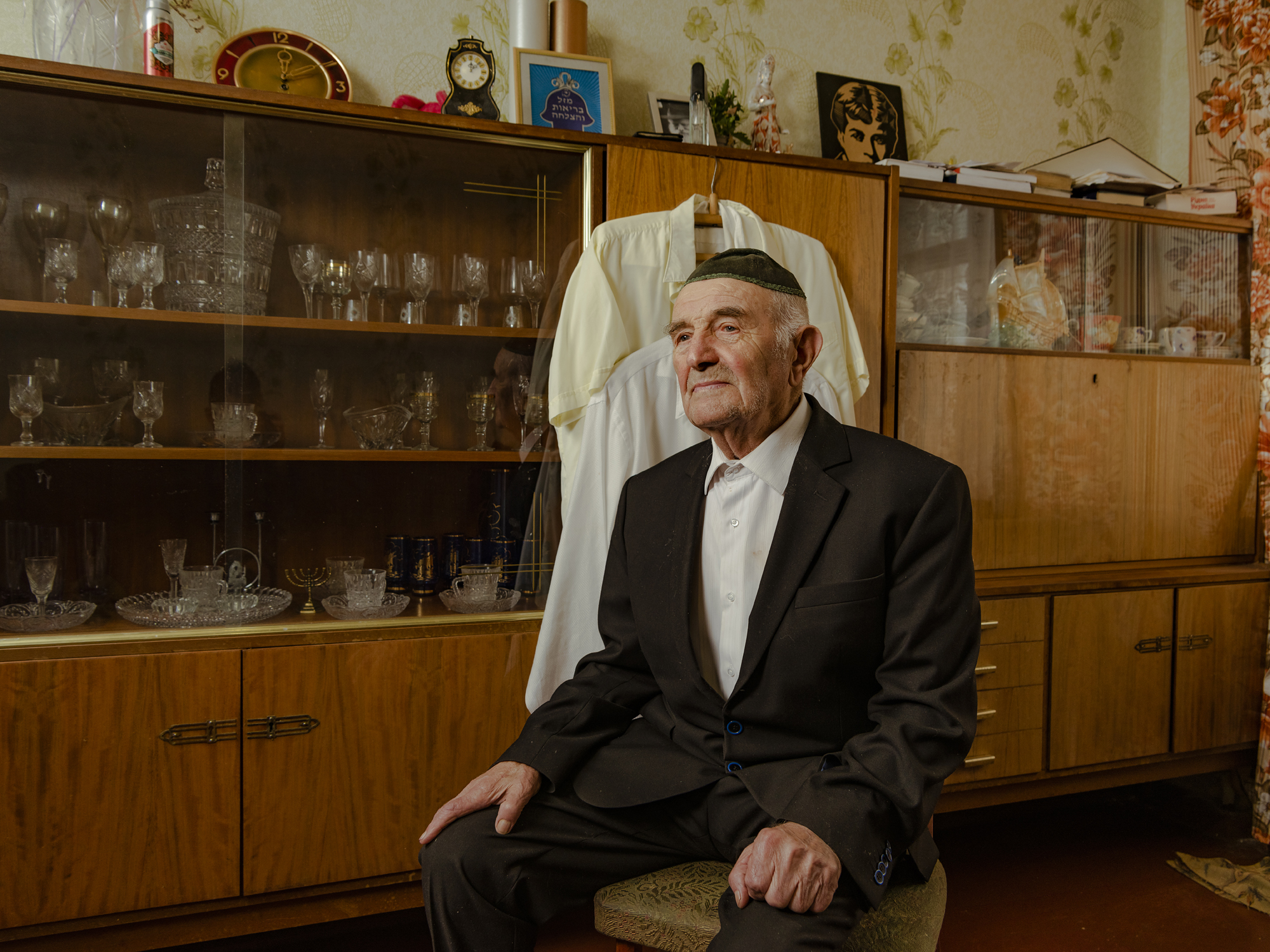
Moisey Weinschelbaum and His Eighty Years of Solitude
[This story was published in the second printed issue of Reporters. Get your copy by joining The Ukrainians Community]
“And you said you weren’t a Jew.” August, 1942
“Take off your pants, you filthy Jew,” the Nazi policeman bared his teeth at him.
“I’m not a filthy Jew,” he said under his breath, timidly looking around the room: maybe there was a way to escape?
“We’ll see if you are a Jew or not. Take off your pants. What are you waiting for?” another police goon said impatiently.
There were two of them in the village council. Huddled in a corner, there was also the village head, projecting the air of a person who was unhappy with the situation, but not prepared to speak out against the armed men.
Misha dropped his pants. And looked down. He blushed, and the room went silent. A few seconds later, everyone erupted in laughter. “And you said you weren’t a Jew. You’re going to come with me to the German commandant’s office. Do you know how much they pay for people like you? Five thousand marks.” The policeman was rubbing his hands as if already counting the money. “This is the end,” Misha thought.
Once outside, he grabbed hold of an acacia tree, clinging on to the trunk as if it was his last straw. The prickly bark was painful, but he held on with all his might. Until the policeman pulled out his gun and cracked it on his fingers. Then Misha let go.
They made their way slowly from Vovchynets, where he had been captured, to Komsomolske, where the German commandant’s office was located. It was a ten-kilometer walk. Over the past year, he had travelled the length and breadth of this place and knew every bush and every stone. “Did Aibishter [a Jewish name for God—R.] save me when my whole family was shot so that I would die now?” thirteen-year-old Misha asked either the Almighty or himself. He looked around in the hope of finding a way to escape. But how do you escape a convoy of two policemen with guns?
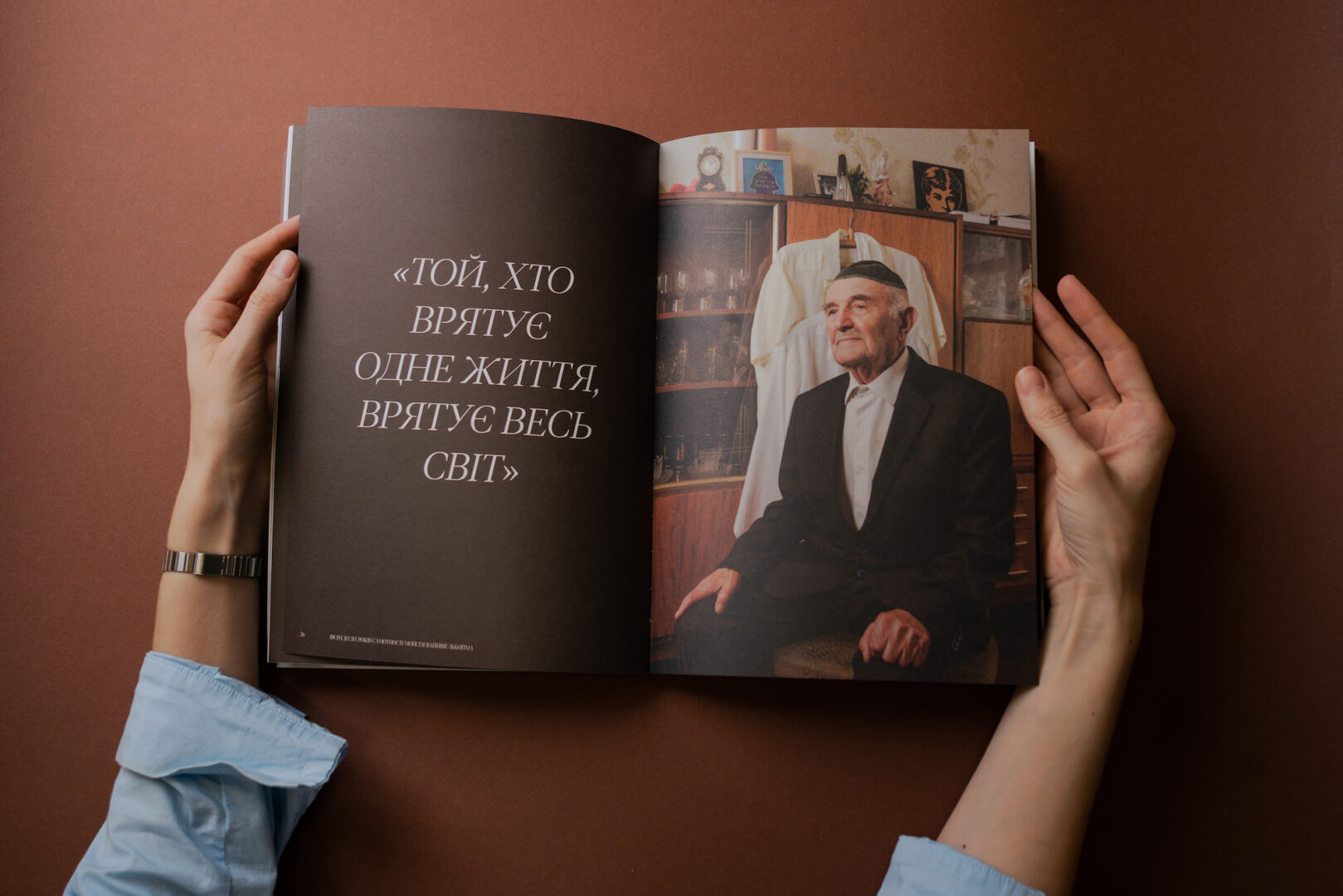
This story was written for the second printed issue of Reporters.
Join The Ukrainians Community to receive your copy of the magazine twice a year.
“The earth will be your bread.” 15 September 1941
He slowly opens his sleepy eyes. His father and three siblings are still asleep. His mother is already on her feet. There is a candle on the table. Mother Feiga kneads the dough. He knows that Feiga means bird in Yiddish. And now she in her own way resembles a beautiful, exotic bird. Her hands, like wings, soar over the dough and plunge into it. The flour falls onto the table like magic dust in the dim candlelight. Misha watches as his mother’s hands-wings make loaves of bread, spread the raw dough pieces on a metal tray and then carefully place them in the oven. Nothing else in the world smells so good. He closes his eyes in bliss.
Bang! Bang! Someone is banging on the window. “Open the door!” Fearful, his mother grabs 13-year-old Misha by the hand, as he lies the closest to the oven. “Hide,” she whispers. Misha sees that his mother looks concerned, and manages to hear her barely-audible words, “Take the bread out of the oven. You will know when by the smell. And cover it with a towel.” His mother hides him behind the door in an alcove near the oven.
Misha sits in his hiding place quiet as a mouse. He hears screams, noises, and the door creaking. The voice of his father Aaron. The frightened cries of his older sisters, Polia and Tsylia. His younger brother Solomon is sobbing. The intruders explain that they are taking everyone to work. Then there is silence.
He doesn’t move. And only when he smells that the bread is ready, does he carefully crawl out of his hiding place. He opens the oven door, and puts on gloves to take out the hot tray with the bread. He places the golden brown, steaming loaves of bread on the table, and covers them with a clean towel. Just as his mother told him.
“What are you doing here, little Jew?” The door was unlocked. The policemen entered the room. Two goons. Neither are German.
“My mother left me here to take the bread out of the oven. Here it is.” Misha points to the steaming loaves of bread as a justification for why he was at home.
“The earth will be your bread. Do you know what that means?” says one of the policemen, laughing. “Stay where you are!”
Misha stands by the table, and they go to another room. He can hear them taking things out of the cupboards and drawers. Something falls and shatters. The boy knows this is his chance. He tiptoes out of the house and runs away.
He rushes to the stables outside the town. Gasping for breath, he runs inside and bumps into the stableman he knows. The old man looks after the horses that drag barrels of poo from the toilet pits at night.
The old man instantly understands what is happening. He pushes Misha into the box for chaff and covers him with a raincoat, leaving a small gap for air. The kid lies trying to take as few breaths as possible.
“You can come out now, the raid is over,” Misha hears the elderly voice afterwards. Who knows how much time had passed: three hours or more? He shakes off the chaff from his stiff arms and legs and cautiously steps outside.
He can’t go home. It’s dangerous there. Sneaking in the twilight, Misha walks to the village of Hryshkivtsi near the town of Berdychiv. To a woman who sells milk to his mother. After hearing the boy’s story, she locks him in her house and goes scouting to see what is happening in Berdychiv.
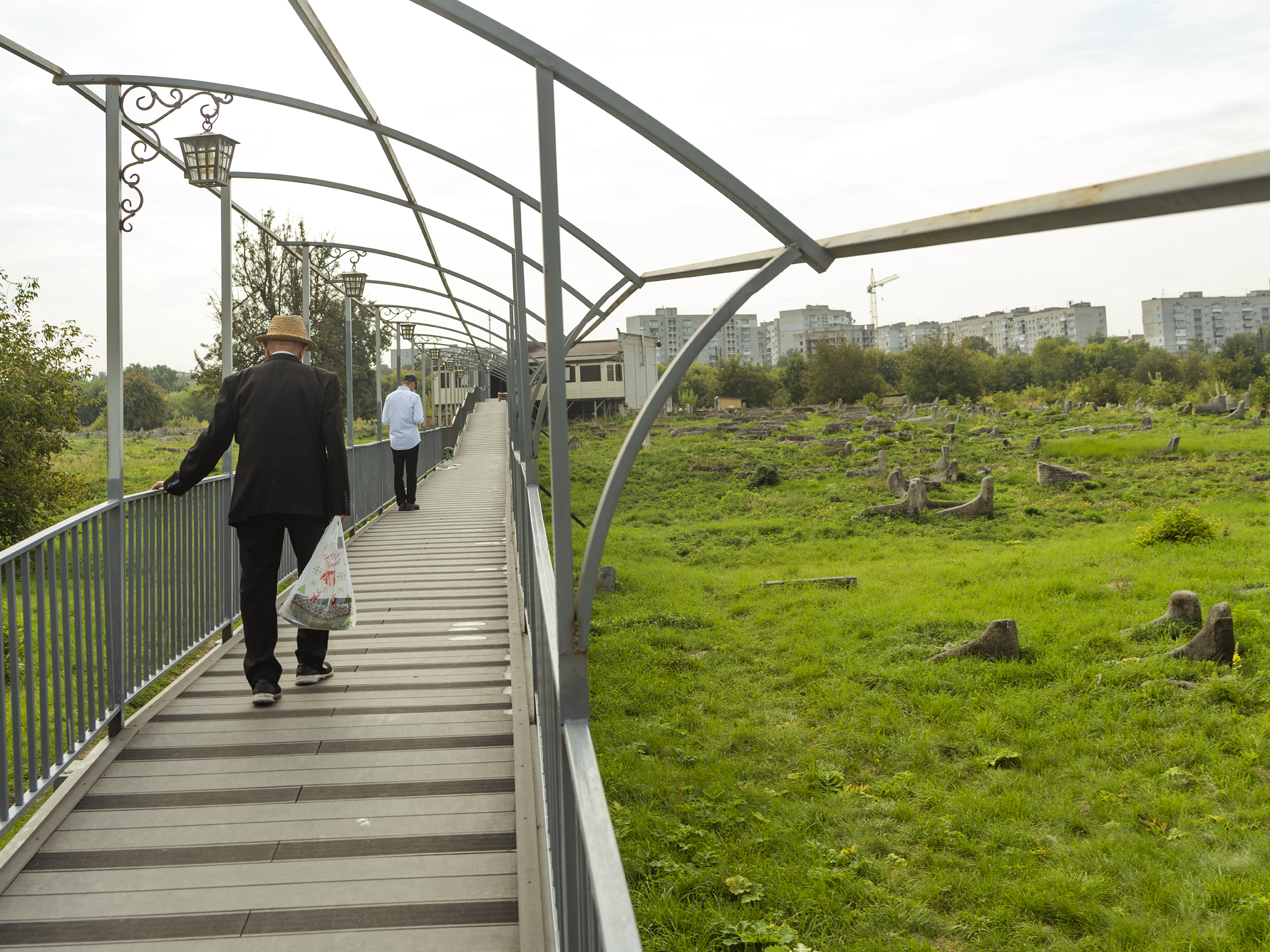
She cautiously opens the door of Misha’s house. Aaron Weinschelbaum, Misha’s father, is sitting at the table with the morning bread, staring at the ground. He doesn’t utter a word. A child’s cry breaks the silence. A woman enters the room with a baby in her arms. It’s Feiga’s sister. A three-year-old boy is clinging to her leg. “They let me go,” Aaron explains. “The Germans need craftsmen. I will repair the canteen for the soldiers. They allowed me to take my family. But Feiga and the kids are no more. So I took her sister.”
Aaron will repair buildings for the Germans for another month. Those Germans who shot his Feiga, 18-year-old Polia, 16-year-old Tsylia and 5-year-old Solomon.
“Who will tell the world that thousands of people were shot, just like that?” The last days of October 1941
In the last days of October, the Nazis were smoking out of the ghetto even those Jews who had previously been of use to them. The canteen for the soldiers was ready. Over three days, everyone was herded into the basements of the Berdychiv Fortress. Misha followed his father in the convoy, afraid of getting lost. The basement was teeming with people and reeked of sweat. Misha’s little cousin died there. His aunt and her eldest managed to escape. She bribed the police. Later, she was shot anyway.
At noon on the fourth day, everyone was taken out of the cellars and into the street. They were lined up and driven out of town. On a large lawn, they were forced to strip down to their underwear. The pile of colorful clothes quickly got bigger. Misha was in no hurry to say goodbye to his belongings. He slowly took off his pants. While unbuttoning his shirt, he scanned the area. Not far from where they were left stripped under the muzzles of machine guns, there was a combine. There was a tall thicket weeds behind it. Misha took one last look at his father. Almost naked, he was already being herded to where machine gun shots could be heard. “Aibishter,” he prayed, “please save me. Or who will tell the world that thousands of people were shot, just like that?” He seized his chance when the policeman turned away, and rushed behind the combine. He stayed still for a few seconds before crawling along the ground. Dry branches and stones tore his bare knees and belly, but the physical pain was drowned out by the gunshots. Unending rounds of gunshots. He crawled on.
Once he was far away enough, he sprang to his feet and ran as fast as he could. He reached a village just as it was getting dark and knocked on the door of the first house.
“Excuse me, kind people.”
“We have heard everything. We know.”
The people indeed turned out to be kind: they gave Misha some milk and their old clothes, and let him stay for the night. In the morning at dawn, they advised him to get as far away from Berdychiv as he could.
Early November. 1941
Misha went wherever the road took him, looking behind his shoulder, feeling like a hare hunted by the wolves.
In the past two months, he had lost everyone he loved. In addition to his parents and siblings, the Nazis shot his five maternal aunts and uncle with all their families.
Only those who had evacuated at the beginning of the war or had moved abroad back in the 1920s were still alive. He was the sole survivor from his huge Berdychiv family. All alone.
“Where are you going, son, and why are you so badly dressed?” a stranger asked, interrupting his thoughts. Misha squeezed into strangers’ old rags.
“I’m going to Vinnytsia. From the skilled trades school,” he said, remembering that there was such a thing: his cousin studied there.
“You are going the wrong way. You won’t get to Vinnytsia this way. Don’t be afraid, tell me what’s the matter.”
Misha looked into the man’s eyes. Could he trust a complete stranger? What if he gave him away to the Nazis? But the man looked trustworthy. And so Misha told him how he escaped being shot and did not know where to go or how he would live.
“I will bring you to good people, and they will hide you,” the man said.
Misha believed him, because what else could he do? The man’s name was Andrii Shcherbatiuk. On the way, they popped into his house. He took a loaf of bread, and they headed to the village of Terekhove.
The first house on the right. They went inside. An elderly woman was cooking.
“We need to save this boy,” Misha’s saviour said from the doorway as he handed the bread to the woman.
Her name was Fivonka. She lived in a small village house with three daughters and three grandchildren. “Seven mouths,” Misha counted. “Why would they need another one?” The man who had promised to help him whispered something to Fivonka. Maybe he was telling her that Misha was a fugitive Jew? Misha could not hear him. He caught only the old woman’s final decision, “We must save this Soviet boy.”
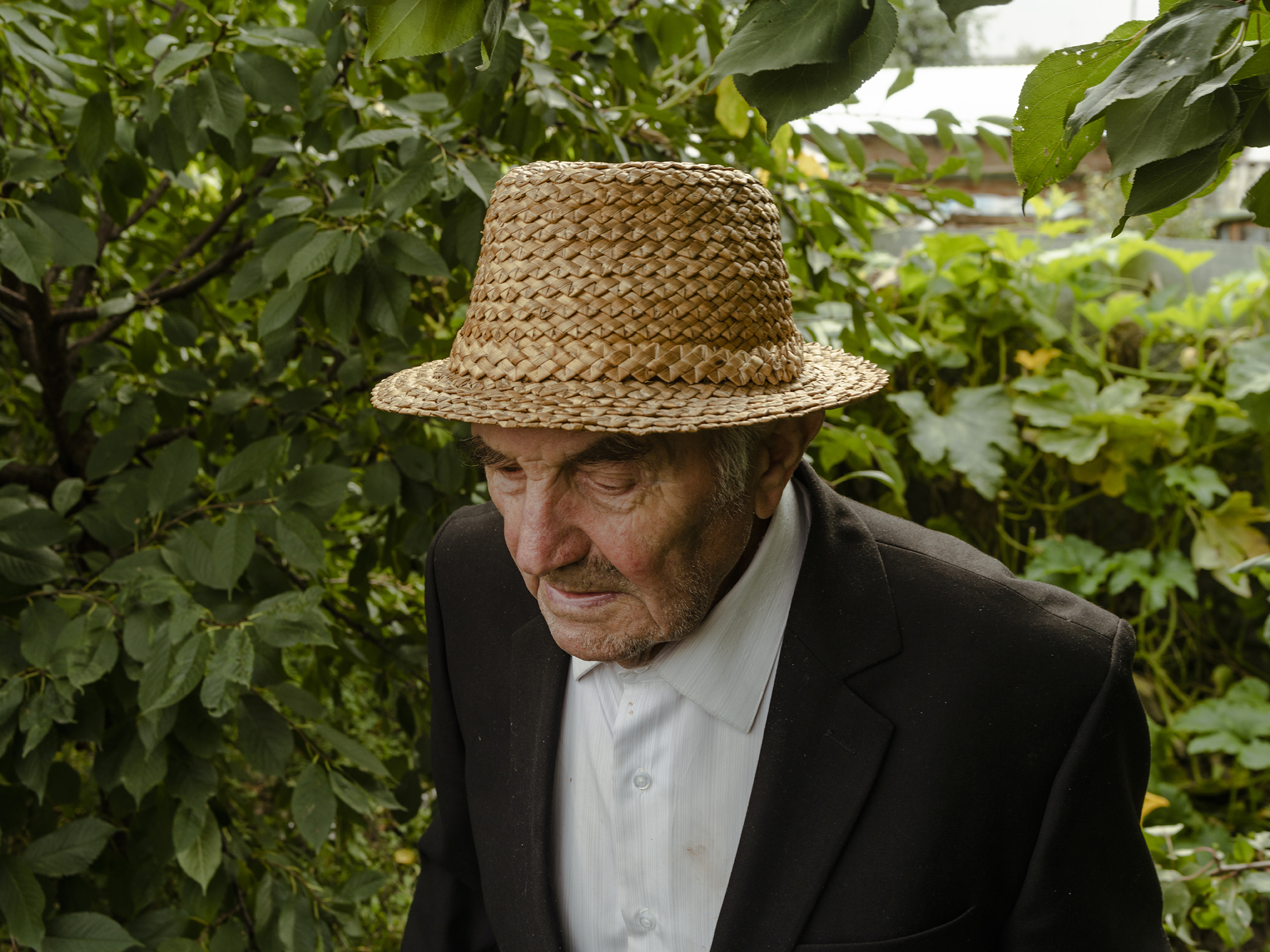
He stayed there as the eighth mouth. When a car approached, Misha would run away and hide in the reeds by the river. If he didn’t have time, he would hide in the basement or attic.
The Nazis often visited Fivonka. They exchanged gasoline or kerosene for eggs and chickens. Fivonka’s relative, Polia, often stopped by. Misha would also hide from her. Everyone knew that the young woman was going out with a German man, so they were afraid. Still, Polia once saw him in the house. Fivonka lied, saying that he was a distant relative. Did Polia believe her? Who knows. But she did not tell her German boyfriend.
For two months, Fivonka fed him the same food as her own children and grandchildren. She poured milk into iron mugs, as they were fortunate to still have a cow, and shared bread made from soy flour equally between all the people living in the house. They didn’t have anything else.
Then Misha said to the elderly woman,
“I’ll go and beg for bread.”
“Go, son. There is no shame in asking. It’s shameful to steal!” Fivonka said, giving him her blessing.
For almost a year, he went around the villages and begged, with a bag on his shoulders and a basket in his hand. He would collect food in the basket and then put it into the bag. He would go out at dawn and return late in the evening, bringing back stale bread, potatoes and beets. They shared it with everyone and survived.
“Born under a lucky star.” August, 1942
It was cool that day, even though it was still August. Misha put on an oversized jacket given to him by the old lady. By lunchtime, he had reached the village of Vovchynets, where he knocked on the door of a house. Once inside, he froze. Policemen were sitting at the table, pouring grey liquid into glasses from a large bottle.
“Can I have some bread?” Misha uttered a phrase he had been practicing for months. And received laughter in response.
“We’ve been looking for you for a long time. You are a Jew. A filthy Jew.”
Misha froze. What should he do? Flee? How would they prove it? He spoke Ukrainian. No one would ever guess at first glance that he was a Jew. His blue eyes and brown hair made him look like a normal Ukrainian boy.
“You’re coming with us to the village council. Once you take off your pants, we’ll see if you’re a Jew after all,” the Nazi policeman grabbed him by the collar. There was nothing he could do.
The truth was revealed in the village council. The police were escorting him to the German commandant’s office, in other words, to be killed. Misha dragged his feet and remembered his mother’s story about his birth. When he was born, the midwife cried, “He will be happy because he was born under a lucky star.” He was named Moisey, after his grandfather. But they always called him Misha.
They stepped on a bridge. The river was flowing below. Misha realized that this was his last chance. He quietly unbuttoned his jacket, and when they reached the middle of the bridge, he jumped. His jacket remained in the hands of the policemen.
Like a wild duck, Misha emerged, gasped for air and dove back down into the water. He heard the sound of guns: the policemen were trying to shoot him from the bridge. It felt like he had swum a mile or two. Then he hid in the reeds by the bank, and left the water only after dark. He made his way across a vegetable garden and crouched under a bush. There were two people in the yard. They were talking about a boy whom the police took to the commandant’s office, saying he had run away and been shot. Misha shivered like a leaf: both from the cold and the fear. And eventually he took the daring decision to reveal himself.
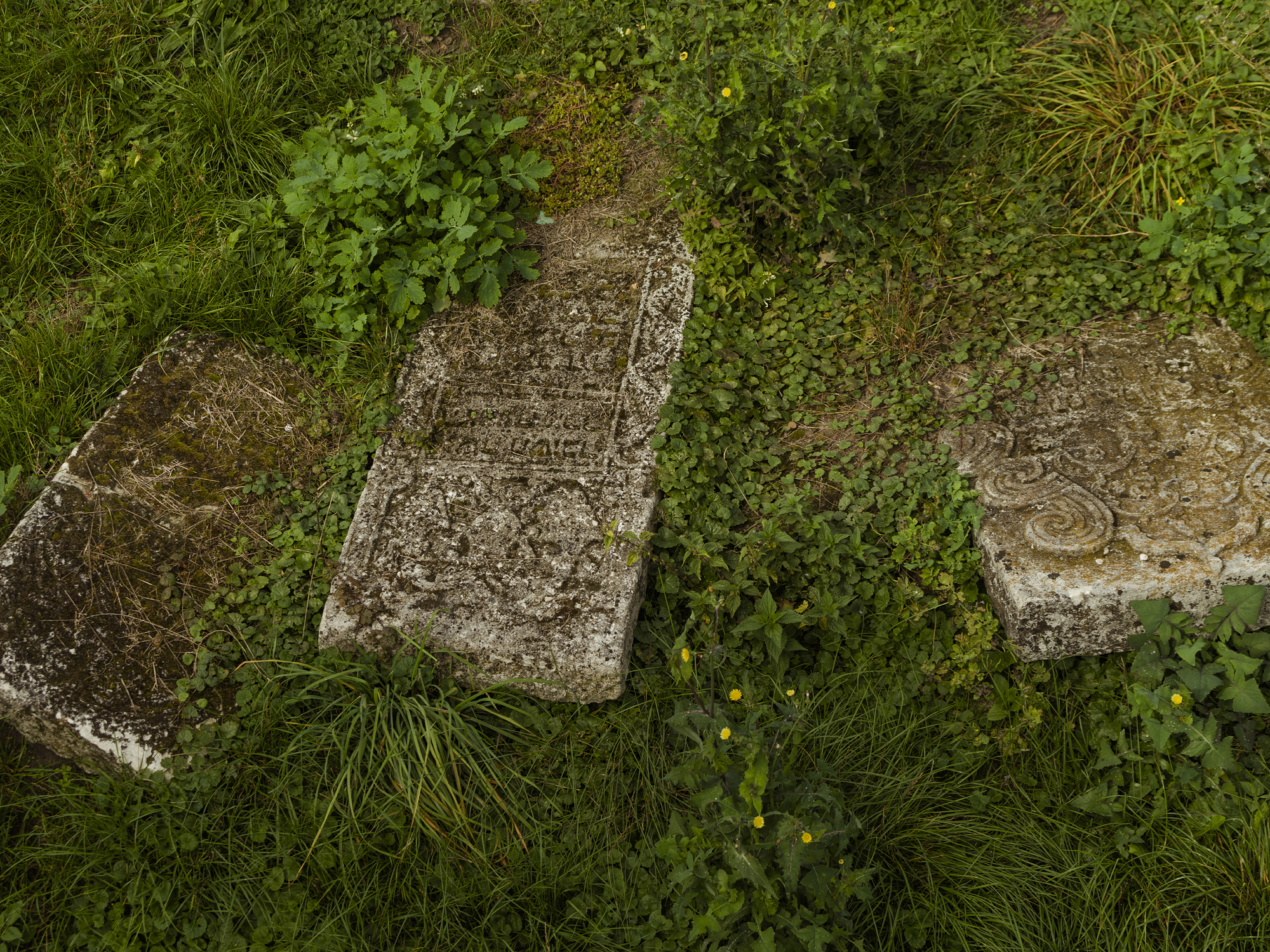
“Please, I’m that boy. Can you please give me some old clothes?” The woman rushed into the house and brought out some clothes and a cup of milk. He put the clothes on, drank the milk, thanked them and bid farewell. Who knew who they were? What if they turned him in?
On his way, he found a half-built house, went inside and lay down on the cold ground. For three or four hours, he just lay there, leaving only after dark. He made his way to Fivonka’s house, and only then burst into tears. Everyone cried. Fivonka heated some water and drew him a bath. She washed him like he was a child. And he understood that this was the last time: he could no longer stay here or go around the villages begging for bread. To survive, he must lie low. Elsewhere.
“I’ll put you in a bag and throw it in the river”
Some good people sent him to work on a farm in the village of Khazhyn. But the owner took an instant dislike to him. When he got drunk, he would threaten him, “I’ll turn you in if you don’t do what I say, you Jewish spawn. Or I’ll put you in a bag and throw it in the river.”
Misha decided not to wait for this to happen and ran away. A collective farm twenty kilometers away was looking for a shepherd. He stayed there, herding cattle and sleeping in a stable with captured Soviet soldiers.
Every week, the German boss would come to the farm in a carriage, do the rounds and meticulously inspect all the workers. Misha would lower his head and put his hand to his chest. He kept a folded sheet of paper in his pocket. A temporary certificate stating that his name was Mykhailo Andriiovych Polishchuk. Fivonka had made him this ID. On the collective farm, everyone knew him as an orphan. Legend had it that a bomb hit his house, his family died, but he managed to survive.
Food was scarce. Pea flour bread, tiny servings of thin pea polenta. Misha chewed on a stale piece of flatbread and thought back to 1933.
How one day Mum got some milk, and he, while no one was looking, would put his little finger in the jug and run it over the surface, gathering up the cream and then sucking on it.
And once they bought some aspic, a liquid used to boil meat products that hardens into jelly. Naturally, the aspic had no meat. While eating, they came across a human nail. After that incident, no aspic was ever served on their table again.
“Our troops have entered the village!” December, 1943
In the last days of December, a cry was heard across the farm, “Our troops have entered the village!” Some people shouted with joy, some threw their hats in the air, while others couldn’t hold back tears. “Is it really over? Misha couldn’t believe that he no longer needed to fear death as he had for the last two years. “Thank you, Aibishter.” Now he often recalled the name of the Jewish God his father talked about years ago.
On December 31, he rode a horse from the collective farm to his savior, Fivonka. This elderly woman was now his only family. Misha, otherwise known as Moisey Weinschelbaum, rushed towards life, leaving death behind. He overtook death. Although he remained alone, with no family whatsoever.
Almost half a century later, Fivonka—Filena Korshevniuk-Savelko—would receive the title of Righteous Among the Nations from the State of Israel. Because, as the Talmud says, “Whoever saves one life, saves the entire world.”
***
“My future mother-in-law asked me to tell her the story of my survival. I started in the evening and finished in the morning. I was talking all night,” Mykhailo Weinschelbaum says with a smile. “Sometimes I don’t even believe that I survived all that and managed to escape three times.”
We are sitting in his one bedroom apartment in downtown Berdychiv. Uncle Misha, as everyone calls him, is wearing a black suit, white shirt, and a yarmulke on his head. His face is wrinkled but bright and welcoming, despite the dark times he has lived through.
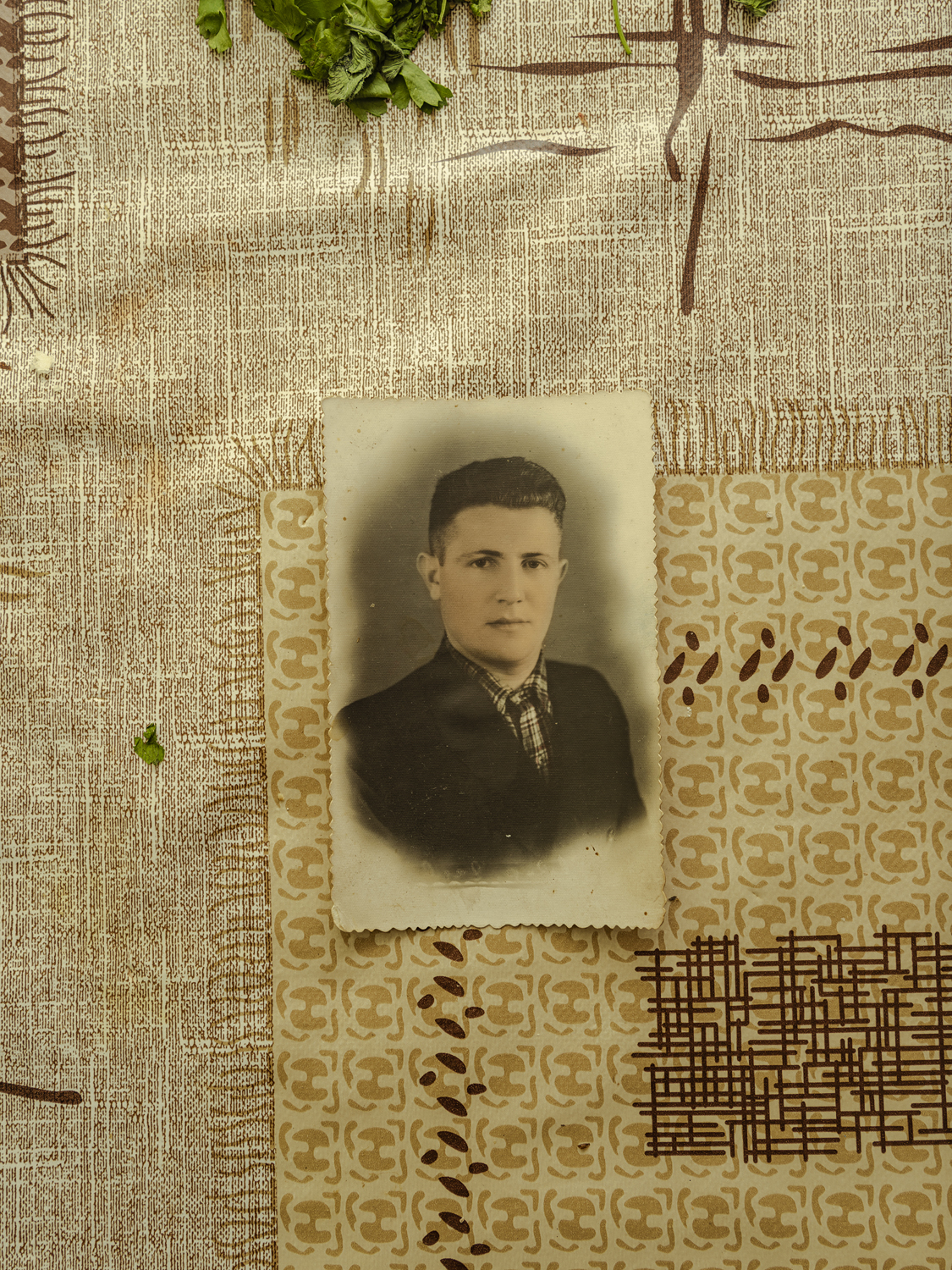
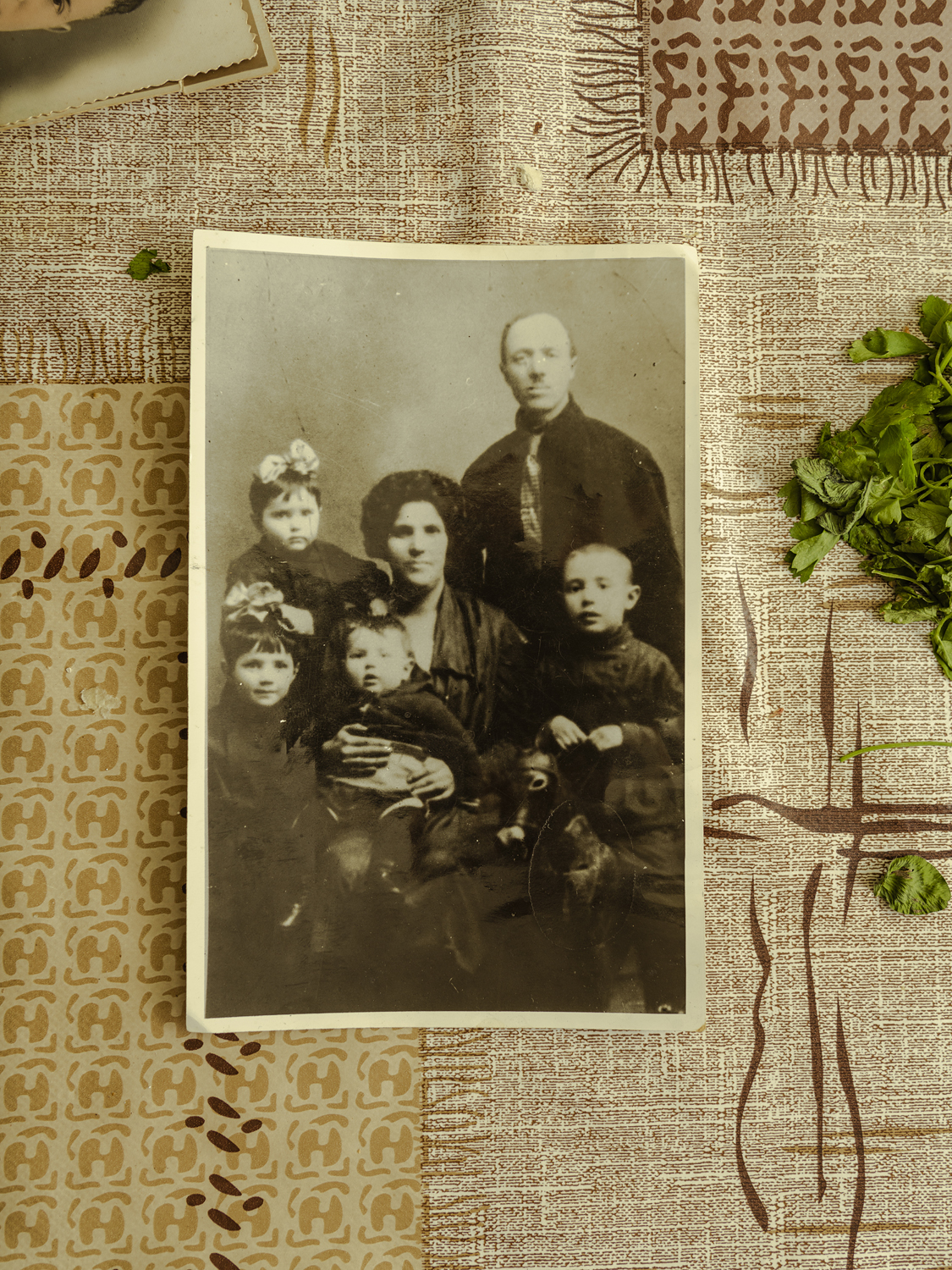
Uncle Misha has only one photo from his pre-war life. It shows a woman holding a little boy on her lap. There is a man behind her, and they are surrounded by older children on both sides. Little Misha is on his mother’s lap. The photo was taken in 1929 or 1930. The people in the photo had no idea of the tragedy that would occur eleven years later. Feiga sent the photo to her sister in America. And in 1961, the sister gave it to her nephew. The only one who survived.
“I am 94 years old, but I am still alive. I’ve just sowed some parsley and planted some potatoes. I love the land. When I retired, I sowed wheat and rye and gave grain to people for free. My grandfather loved the land. And my dad loved it. I remember that we always had a vegetable garden behind our house,” Uncle Misha says, assuring us that even at 94 he lives a full life.
When the war ended, Mykhailo Weinschelbaum settled in Berdychiv. The Jews who managed to flee and survive returned to the city, and he stayed with some distant relatives. After serving in the Air Force, he married a girl named Sophia, and they lived together for 65 years. All the time he worked at the mills. He harvested and ground grain, then delivered the flour. Maybe this was his subconscious way of keeping his last memory of his mother and his last day with her alive: Feiga kneads the dough, and the flour falls onto the table like magic dust in the dim candlelight.
Ten years ago, with the death of his wife, he was orphaned yet again. Although, to tell the truth, he had always felt lonely. How can you explain to someone what it’s like to survive when everyone else is dead?
There are several light-colored shirts on a hanger in the room: Uncle Misha dresses every day like it is a holiday. Because he knows better than anyone: every day is a holiday if you have woken up alive in the morning. Despite his respectable age, the man who is approaching 100 descends four flights of stairs and heads for the synagogue and the Jewish cemetery. To pray and thank God. For his eighty years of solitude.
“I am alone. Such is my fate, I guess. Someone is in charge of us. As the Hebrew books say, “God gives the soul, God takes the soul.” But what is the soul? Does it come from the word ‘breath’?” Uncle Misha looks into my eyes as if trying to find an answer. I stay silent. “You don’t know, do you? I don’t know either.”
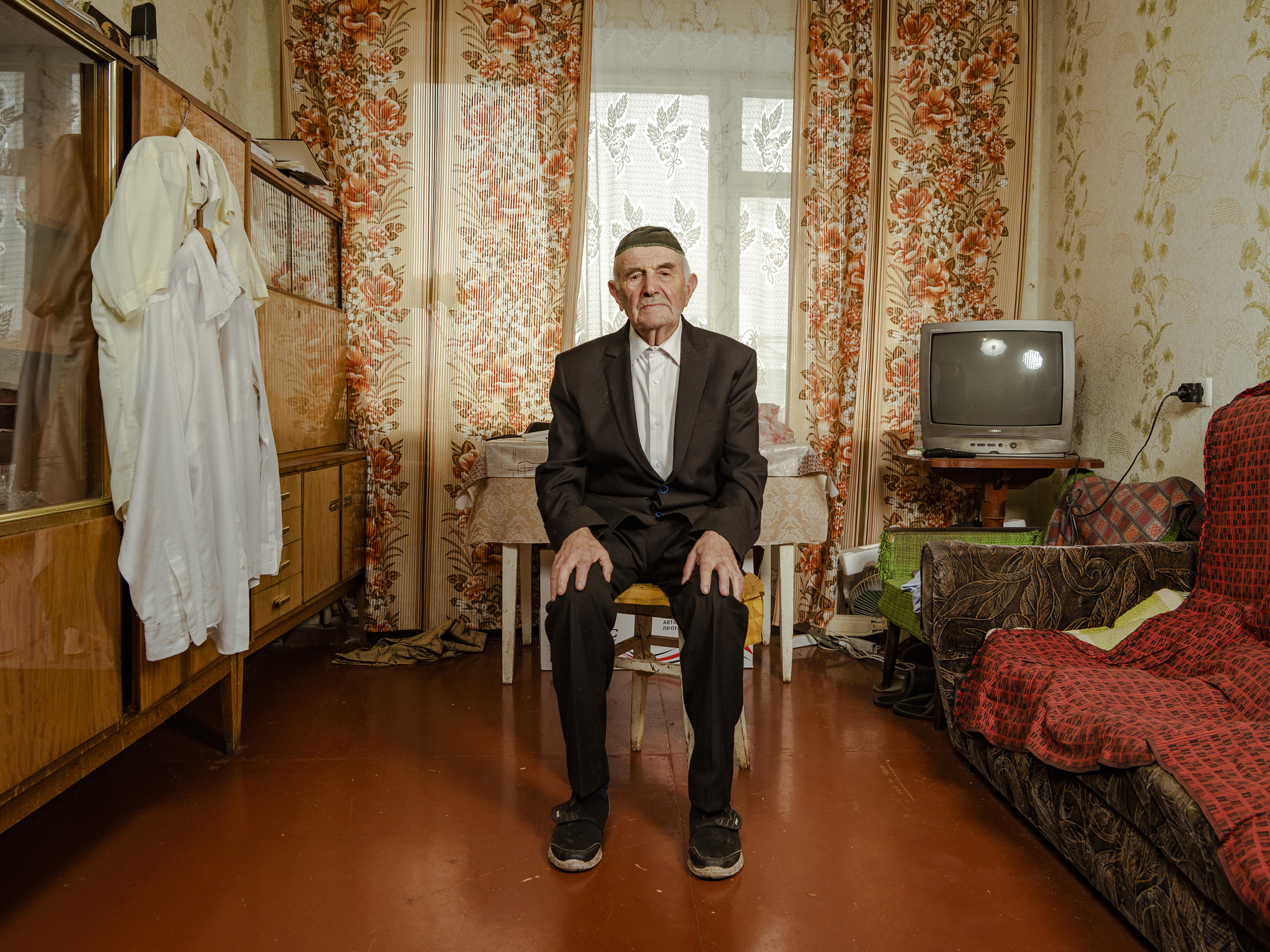
Have read to the end! What's next?
Next is a small request.
Building media in Ukraine is not an easy task. It requires special experience, knowledge and special resources. Literary reportage is also one of the most expensive genres of journalism. That's why we need your support.
We have no investors or "friendly politicians" - we’ve always been independent. The only dependence we would like to have is dependence on educated and caring readers. We invite you to support us on Patreon, so we could create more valuable things with your help.
Reports130
More






